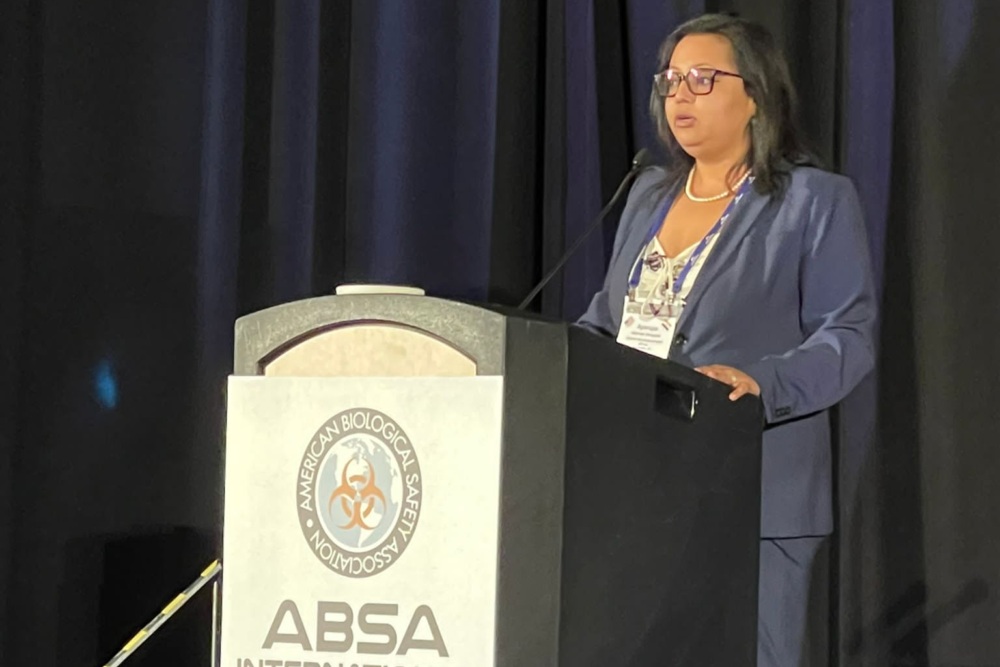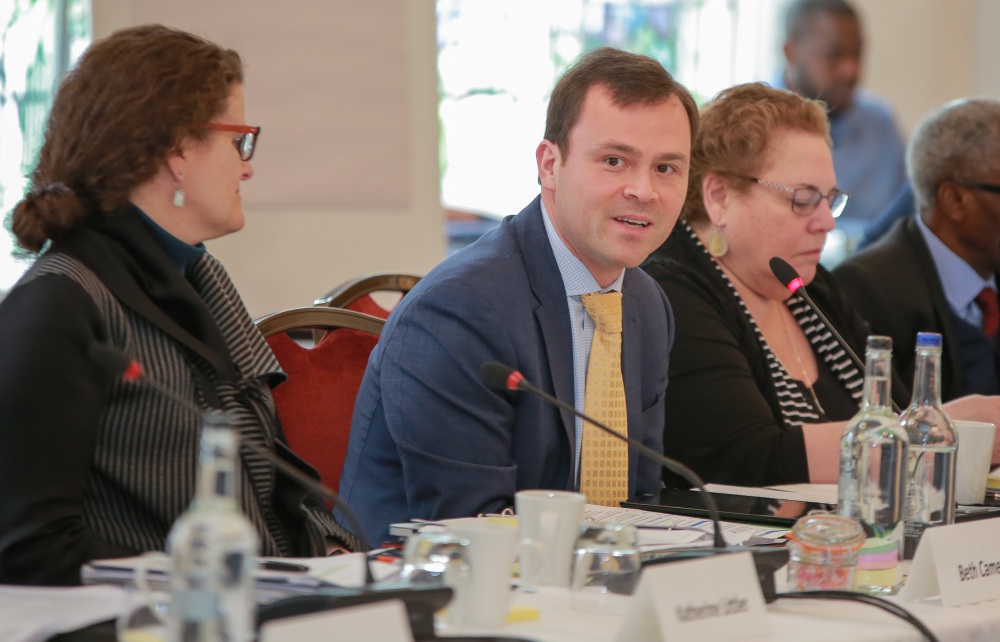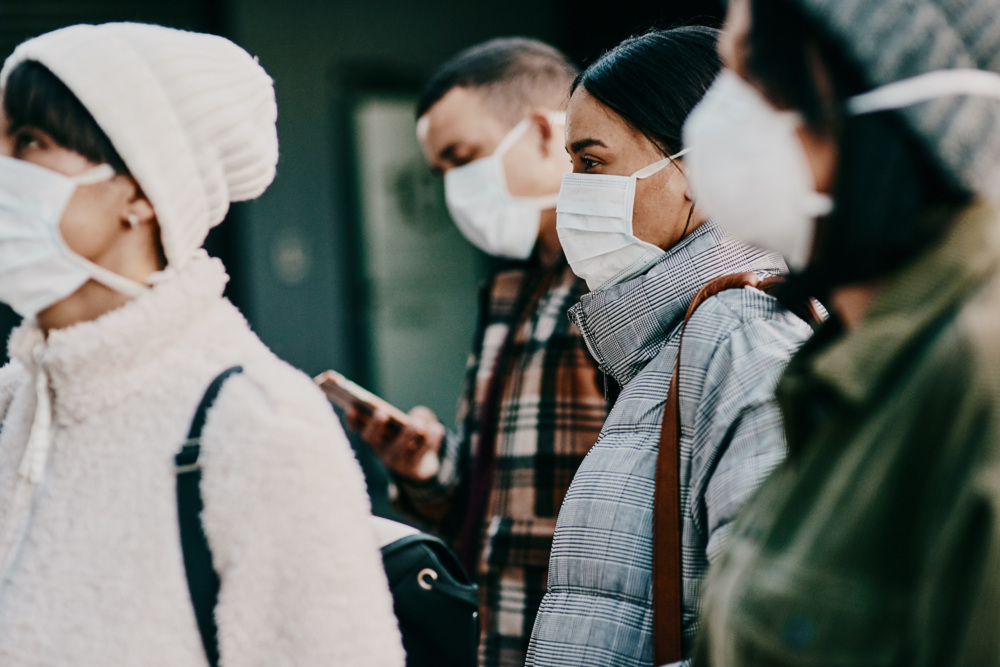
Beyond Borders, Beyond Biases: Building a Biosecure Future with Diverse Voices
NTI | bio Senior Program Officer Dr. Aparupa Sengupta on why efforts to strengthen global biosafety and biosecurity must prioritize diversity and inclusion.
Atomic Pulse
Jake Jordan
is NTI’s senior director for Global
Biological Policy and Programs. Previously, he served as a chief scientist
at Booz Allen Hamilton, where he worked as the senior science and technology
advisor to the Office Director and Deputy Director of the Defense Advanced
Research Projects Agency (DARPA) Biological Technologies Office (BTO). From
2009-2014, Jordan worked as subject matter expert supporting research and
development programs in the DARPA Microsystems Technology Office (MTO) and
Defense Sciences Office (DSO). Jordan holds a Ph.D. and M.S. in Chemical
Engineering from the University of Virginia and a B.E. in Chemical Engineering
from Vanderbilt University. He sat
down with NTI’s Caitlyn Collett for
the latest in Atomic Pulse’s “Get to Know NTI” series.
So, you arrived in
your role at NTI last year after supporting the Department of Defense as a
consultant. What inspired you to make this switch from government consulting to
non-profit work?
That’s a great question. In my previous job I worked on biotechnology
research and development (R&D) projects in support of the Defense Advanced
Research Projects Agency.
I really appreciated the gap analysis that went into this
work. You fundamentally ask the question of how do I get from A to B? But there
are layers under that: what are the really hard problems that I need to solve? What
expertise do we need to bring together to generate new ideas that can solve the
problem? I really enjoyed those pieces. I had done that sort of work for over nine
years, always focusing on the particular needs of the Department of Defense.
Over time I started to see other spaces where creative
solutions could have an immediate and more global impact. It was that space at
the intersection of security, health, and international relations that began to
excite me more and I started looking for a new opportunity that would allow me
to work at this nexus.
What really drew me to NTI was exactly that: an ability to work
across these areas, expanding beyond the technical gap analysis and beginning
to apply my skills to address global policy gaps and technology implementation
challenges. Even if the most innovative technology in the world exists to solve
a particular challenge, there still need to be ways to implement and
disseminate the technology to maximize global good. At the same time though,
this has to be done in a way that minimizes risks associated with that
technology. Improving global health through international cooperation, but not
at the expense of security. It was an exciting opportunity that I couldn’t
resist.
Well, we’re grateful
that you’re on our team. What are you currently working on with NTI?
I spend most of my time right now working to advance NTI’s Biosecurity
Innovation and Risk Reduction Initiative. I really enjoy this initiative because
it looks at the vital advances at the forefront of biotechnology R&D and
seeks to maximize innovations in biosecurity that can prevent misuse and
ultimately save lives.
Within this initiative, we acknowledge the idea that
biotechnology advances will benefit society, but at the same time, we recognize
there are risks associated with these advances.
We’re thinking about how those risks have outpaced the
ability of governments to provide effective oversight. We want to look at what
can be done as a technical community, such as scientific leaders, global technology
networks, professional societies, etc., to develop creative actions to more
quickly identify and reduce these risks. These are solutions created outside of
a government mandate to speed implementation by those developing and using the
technologies, but we want them to also inform governments that are actively
considering governance challenges associated with technology advances.
I think most importantly, this initiative helps strike a
balance between innovation and security. It’s a fun and impactful place for
someone like me who thinks about R&D, but also comes from a security or defense
background.
That’s a great intersection
of your interests. I see that you got your Masters and Ph.D. in Chemical
Engineering. So, what got you interested in the role of biological threats?
Biological threats weren’t an obvious choice for me. My dark
secret that I probably shouldn’t share, but will, is I never took a biology
class in college.
No way.
It’s true. I took AP Bio in high school, but nothing in
college. I’m perhaps showing my age, but this was before chemical engineering departments
regularly started including biology and biotechnology as a core component of their
programs. It wasn’t until a research project I did the summer before my senior
year in college that I did anything with a direct relationship to biology or
biological systems. In that case, we were trying to immobilize a virus on
patterned surfaces to use as a bacterial sensor. So, I started learning about
biology and got exposed to some interesting research ideas that were taking an
engineering approach to solve biological problems. Then, in graduate school, I dove
in, pursuing work on protein engineering and protein purification. I was set to
take a job in the biotech industry after graduation but a graduate school
classmate introduced me to an opportunity to support biotechnology R&D
within the Department of Defense. This role grew my understanding of the
biological threat space, and spurred interest in the technologies necessary to
counter them.
So, it’s almost like
your entire career course was influenced by that single project.
Yes, one summer project, 10 weeks and it led me down a
completely different path.
So, I picked biology studies back up in grad school. I took
biochemistry and biophysics classes. But, no formal training.
Don’t worry, I don’t
think they’ll take your world saving license away. You’re doing a great job. When
you’re not saving the world from impending epidemics, what is your favorite way
to spend the day?
Living in D.C., a good day has to include a trip to a
museum, right? I have two small children, both of whom love the Udvar-Hazy Air
and Space annex to the Smithsonian National Air and Space Museum where they
have the SR-71 and the space shuttle. They’re also big fans of the National
Building Museum, so you might find us there building and destroying a few foam
buildings. They’re like miniature Godzillas. Then, maybe if I’m lucky, I would squeeze
in a run in the morning with a little bit of time to myself. I really enjoy
running, but I don’t get nearly enough time to do it. For me, it’s a time to
clear my mind, without having two or three or five voices chiming in my ear –
these are literal people, not just voices in my head – and really be free to
let my mind wander.
I’m quite jealous, I
don’t think I’ve ever found joy in running. My next question is, if you could
give everyone in the world a piece of advice today and they would all be
listening, what would it be?
So, this is a little sappy, but I think it really holds
true. It’s probably something that builds on what I learned from either my
mother or my grandmother as a child. It’s just this: “Treat other people the
way you want to be treated.” I think many of the problems, many of the
challenges, on a local or global scale, can and should be approached with this mindset.
Say you have an idea or want to put forward a concept for
discussion. If you put yourself in someone else’s shoes and rationally think
through how they might perceive the idea, you can find the areas of potential
disagreement, address them early on, and arrive at something that’s more likely
to be more universally accepted. This isn’t magic, it’s just taking a minute to
look beyond yourself and consider alternative points of view. The same goes for
a new idea that’s presented by someone else. Rather than saying all the reasons
it won’t work, we should acknowledge the potential benefit, and consider the effort
that went into developing the idea. So that’s my little piece of advice. It’s
simple but it’s true.
I think everyone
could learn from that. Sending good out into the world will often bring good
back to you. Speaking of which, my final question is this: if you had just won the
lottery what would you do with the money?
Well, the easy answer would be to fund all the wonderful
ideas that our program has. A large donation to NTI | bio!
I think I would use the money to target and resolve
socioeconomic disparities and the problems associated with them. Again, it goes
back to treating others the way you want to be treated! Access to a large sum
of money really buys your freedom – time – to think creatively about solutions
and integrate ideas from disparate areas. I would keep working on solving
global challenges, continuing the work that we’re doing here every day, and try
to bring additional voices into that conversation, especially people from
different sectors that maybe don’t traditionally think about biosecurity. I
think having their voices and intellect thinking about that problem would be
exceptionally valuable, and hopefully a little of my lottery winnings would be
enough to peak their interest.
That’s wonderful. The
world would certainly be a better place if you won the next lottery, so I’m
rooting for you. Is there anything else that NTI doesn’t know about you that
you’d like to share?
Wow, I don’t think I have anything else. I already told you my
deepest, darkest secret.
Your secret is safe
with me.
Sign up for our newsletter to get the latest on nuclear and biological threats.
NTI | bio Senior Program Officer Dr. Aparupa Sengupta on why efforts to strengthen global biosafety and biosecurity must prioritize diversity and inclusion.
NTI is working with international partners to develop a new Joint Assessment Mechanism (JAM) within the office of the UN Secretary-General to rapidly identify outbreak origins. Without the ability to quickly determine the origin of an outbreak, researchers are hampered in their ability to rapidly develop vaccines and other medical countermeasures that can slow the pace of the outbreak, ultimately saving countless lives.
NTI | bio Senior Director Nathan Paxton on using democratic collaboration to improve pandemic security


